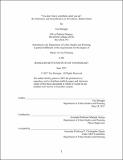| dc.contributor.advisor | Mariana Arcaya. | en_US |
| dc.contributor.author | Strongin, Fay (Fay Vogel) | en_US |
| dc.contributor.other | Massachusetts Institute of Technology. Department of Urban Studies and Planning. | en_US |
| dc.coverage.spatial | n-us-ri | en_US |
| dc.date.accessioned | 2017-09-15T14:21:41Z | |
| dc.date.available | 2017-09-15T14:21:41Z | |
| dc.date.copyright | 2017 | en_US |
| dc.date.issued | 2017 | en_US |
| dc.identifier.uri | http://hdl.handle.net/1721.1/111259 | |
| dc.description | Thesis: M.C.P., Massachusetts Institute of Technology, Department of Urban Studies and Planning, 2017. | en_US |
| dc.description | This electronic version was submitted by the student author. The certified thesis is available in the Institute Archives and Special Collections. | en_US |
| dc.description | Cataloged from student-submitted PDF version of thesis. | en_US |
| dc.description | Includes bibliographical references (pages 97-103). | en_US |
| dc.description.abstract | This paper uses a mixed methods approach to investigate the extent of gentrification in Providence neighborhoods, in order to contribute to policy-relevant research on gentrification in weak market contexts and in Providence, specifically. While Providence has not been the subject of many investigations on the subject of gentrification, this paper finds evidence of gentrification in Providence, with gentrification defined as a process in which low-income neighborhoods experiencing substantial rent increases also experience gentrification-associated demographic change. This paper finds that gentrification in Providence is limited to select neighborhoods and is of a more limited extent and pace than that which has been documented in strong market cities. Additionally, this paper conducts a qualitative analysis of the rationales that form the rationale basis for community development work in Providence, and finds that within Providence's current weak market conditions, revitalization activities have not needed to and have not sought to actively manage displacement risks. Finally, this paper finds that anticipated economic growth could catalyze a rapid increase in gentrification and displacement pressures which practitioners are not currently prepared to manage. Based in these findings, this paper recommends that Providence practitioners undertake to create a pro-active, comprehensive, context-specific 'development without displacement' strategy to manage neighborhood change in Providence. | en_US |
| dc.description.statementofresponsibility | by Fay Strongin. | en_US |
| dc.format.extent | 103 pages | en_US |
| dc.language.iso | eng | en_US |
| dc.publisher | Massachusetts Institute of Technology | en_US |
| dc.rights | MIT theses are protected by copyright. They may be viewed, downloaded, or printed from this source but further reproduction or distribution in any format is prohibited without written permission. | en_US |
| dc.rights.uri | http://dspace.mit.edu/handle/1721.1/7582 | en_US |
| dc.subject | Urban Studies and Planning. | en_US |
| dc.title | "You don't have a problem, until you do" : revitalization and gentrification in Providence, Rhode Island | en_US |
| dc.title.alternative | Revitalization and gentrification in Providence, Rhode Island | en_US |
| dc.type | Thesis | en_US |
| dc.description.degree | M.C.P. | en_US |
| dc.contributor.department | Massachusetts Institute of Technology. Department of Urban Studies and Planning | |
| dc.identifier.oclc | 1003291357 | en_US |
